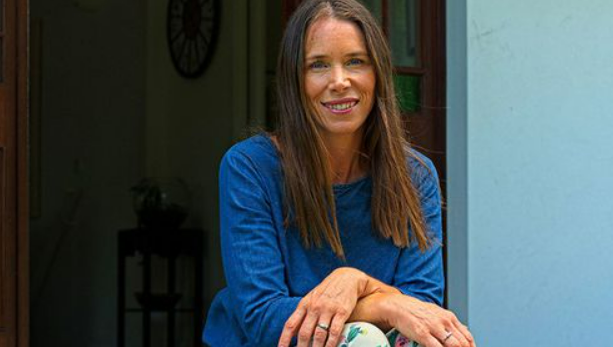After flying for a family funeral all Annabel wanted was a smooth trip home. What followed was ‘degrading
After flying up to Queensland for a family funeral, all Annabel Selby-Jones wanted was to get back to the comforts of her Sydney home at the end of a long and emotional day.
But Jetstar scuppered those plans with a last-minute decision to cancel its final Brisbane-Sydney flight of the day, stranding Selby-Jones, and leaving her upset and doling out cash for a variety of expenses suddenly thrust upon her.
One month on, the saga still brings up a lot of anger for Selby-Jones, particularly the way she claims Jetstar staff managed the lead-up to the cancellation and the litany of problems that followed.

“We left the (funeral) wake early to get to the flight on time,” Selby-Jones said.
“We could have stayed with our family.”
Instead, her dinner that night was a meal of nuts from a minibar and the “degrading” experience of staying overnight in a hotel with no toiletries, personal hygiene items, fresh clothes or underwear to fly home the next day.
The 49-year-old communications executive said her ordeal, including Uber and overnight airport car parking costs, shows how Australia’s aviation passenger compensation scheme is “absolutely lacking”, and leaves passengers unfairly at the mercy of airlines.
Selby-Jones said a beefed-up system with specific levels of compensation, like that which protects passengers flying in the European Union, would reduce cancellations and delays.
“It will cost (airlines) financially,” Selby-Jones said, if clear tiers of compensation must be paid to passengers who suffer inconvenient cancellations and delays within an airline’s control.
“Right now it’s costing (airlines) from a reputation point of view, but it doesn’t seem that matters to them.”
Urged on by various consumer advocate groups, including the Australian Competition and Consumer Commission, the federal government is currently considering its options in a white paper that could mandate commercial carriers into a much more clearly defined passenger compensation process.
Selby-Jones is keen for this to happen, saying a new scheme would “encourage the airlines to do better in the first place”.
After the cancellation and a confusing wait at the terminal which dragged on for hours, with “one (Jetstar) man kind of roving around with about 20 people in a queue following him”, a bus eventually arrived to take the marooned group to a hotel, Selby-Jones said.
Jetstar gave Selby-Jones and each passenger a $30 food voucher to use at the hotel but by the time they arrived at 11pm, room service had closed, rendering the coupons worthless.
Instead, Selby-Jones sat in her room eating nuts from the minibar.
Making matters worse, she had travelled with no baggage on what should have been a straightforward same-day trip.
Selby-Jones had to use hotel body soap to remove her make-up, and the next morning she “had nothing to put on my face, no deodorant, couldn’t brush my teeth”.
Do you have a travel story that caused major inconvenience and costs? Email msaunokonoko@nine.com.au
She paid $35 for an Uber back to the Brisbane terminal for a flight that was also delayed, she said, and then in Sydney was slugged $63 for overnight parking because of the unplanned layover.
A Jetstar spokesperson said the airline was “sorry” for the impact to passengers after Selby-Jones’ flight was cancelled, explaining it was because a crew member “became unwell”.
“Customers were rebooked on the next available flight, and for those away from home, we provided accommodation and covered meals and other reasonable expenses including transport to and from the airport,” the spokesperson said.

According to most recent monthly data, in March Jetstar recorded the highest percentage of flight cancellations among Australian carriers, with 7.1 per cent, followed by Qantas on 3.6 per cent and Virgin Australia at 2.6 per cent.
In February, Jetstar again posted the worst cancellations with 6.4 per cent of flights, more than Qantas on 4.4 per cent, and Virgin Australia at 3.5 per cent.
Similarly, Jetstar ran the highest cancellations in January, its 7.3 per cent more than triple the number of flights axed by Qantas and Virgin Australia.
When 9news.com.au asked about Jetstar’s recent performance, the spokesperson said “everyone across the business is committed to improving the punctuality and reliability of our operations”.
“We are continuing to invest in new aircraft, recruit more staff in customer service, engineering and operational roles and upgrade our systems and processes,” they said.
Australian Lawyers Alliance (ALA) spokesperson Victoria Roy said Australia lagged behind much of the world when it comes to protecting traveller’s rights, and that the alliance was “advocating hard for reform” in this area.
“The difficulty is that in Australia there is just no incentive for airlines to run on time and no accountability if they don’t run on time, because there is no cash compensation scheme for delayed and cancelled flights, like there is in so many other jurisdictions,” she said.
In the EU, passengers are entitled to specific set amounts of compensation if delayed by three hours or more, with tiered amounts based on the length of delay.
A similar scheme should apply for Australian carriers, when disruption is with an airline’s control, Roy said, acknowledging that medical emergencies and extreme weather cause upheaval.
“But operational reasons, or if crew are sick and not enough standby crew have been rostered on, those sorts of circumstances are within an airline’s control.”
Roy hoped the government white paper will help pave the way into “a straightforward and simple scheme” for passengers, instead of Australians having to “jump through legal loopholes in the rare circumstances” where compensation is available.
The aviation sector was hugely impacted by the coronavirus pandemic, and airlines have struggled to return to normal operations.
In its submission to the white paper, the ACCC said passengers had increasingly raised concerns and frustrations about the sector.
The watchdog listed high prices, poor customer service, decreasing service quality, uncertainty of rights, and a lack of accountability as the main areas of complaint.








